Our content is reader supported, which means when you buy from links you click on, we may earn a commission.
In 1999, I was already on my third job just a couple of years after graduating from college. None of the jobs I held ever felt right. I was desperate for a change, so I became interested in the idea of starting an online business.
After searching for months, I finally found the opportunity, and everything clicked. I saw a way to get out of having a job by preparing for an exam. While I prepared, I put together training materials for others.
I had some validation through market research as well as a unique angle for my training program so I hoped it would sell.
You may be in the same place, thinking about starting an online business. Maybe you’ve even already started creating an online course. In my opinion, creating online courses is a great business model. You spend the time creating your online courses and then you’re able to sell them to hundreds, even thousands of people, or many more.
Since my start, I’ve created more than one online course business. Through all my experience, I’ve recognized that there are a few moving parts to coming up with a profitable course idea.
I want to cover my idea process in this guide. That way if you want to develop your own online course, you have the absolute best chance of pursuing a profitable course idea.
I’ve broken the process down into three main steps; idea generation, validation, and refinement. You’ve got to do all three steps before you settle on an idea to have the best chance of success.
The first step to finding a profitable online course idea is to brainstorm. Your ideas don’t have to all be good, but you need to generate an exhaustive list if possible. You’ll sort through them later.
There are two options for generating ideas to create an online course around. The first one is where you work in a topic area you already know. The second one is where you’re willing to get into just about any topic as long as it will be profitable.
Finding an Online Course Idea You Have Knowledge In
First, let’s get into how you can uncover the right idea if you’re trying to base your topic on your background.
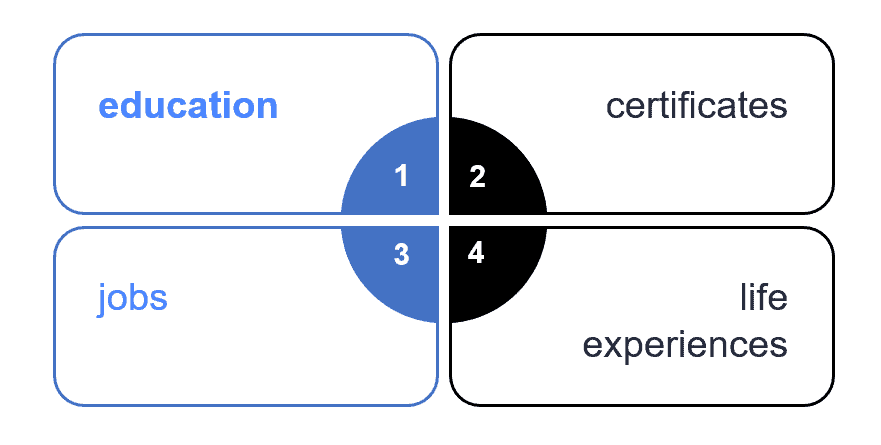
There are four main areas of your life you will want to examine. These are:
- your education
- any certifications you may have
- your job
- and your life experiences
Let’s start going through these areas next.
Your Education
If you spent years in school, then you obviously have a great deal of knowledge in whatever you studied. Your knowledge can be related to your degree, specific classes, or even general educational topics (like how to study).

Think about any degrees you have. Even if you just graduated from high school, you may find a great online course topic mixed in with your educational experience.
Specific classes you took can turn into an online course. These might include advanced placement (AP) courses in high school, trade school classes, and anything else.
You can also consider general topics. These include ideas like how to select a degree, how to get good grades, how to get into the right college, how AP classes in high school work, and many others.
As you can see, there are many options for generating ideas from your past education. Here are a few successful course creator interviews to give you ideas:
- How Angel Pretot Makes a Full-Time Living Teaching French Online (Even with a Tiny List)
- How Jonathan Polley Traded in his Teaching Job to Grow MakeScienceEasy.com So He Could Work Around His Family’s Schedule
- Resit Gulec Shares How He Started a Project Management Training Empire
Certifications or Licensing
Think about any certifications or licenses you may have. These are often exams you passed outside of school.
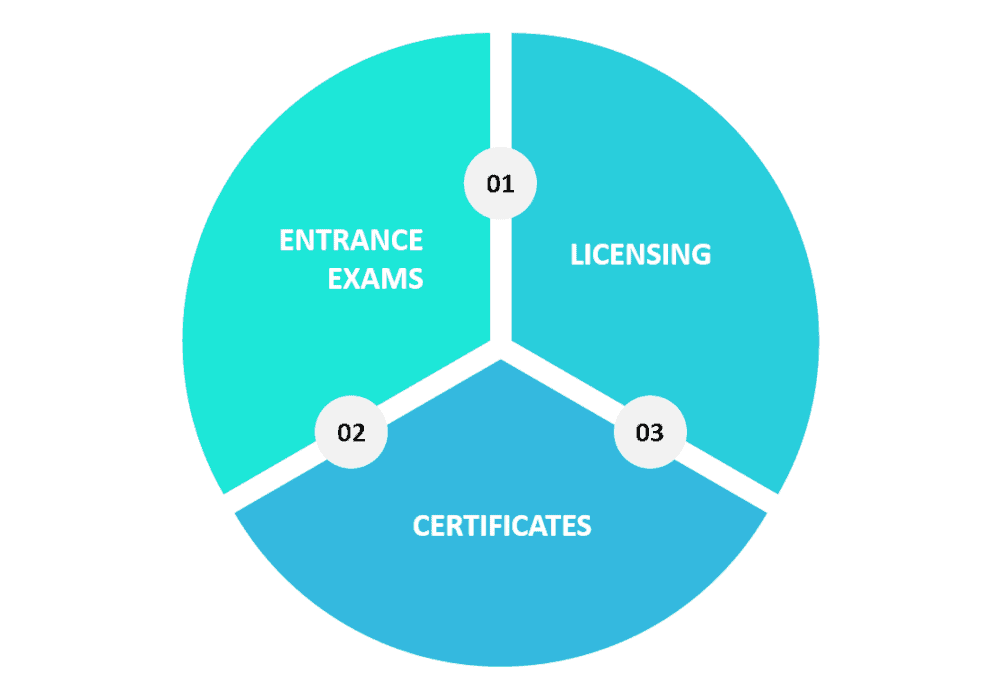
For instance, if you’re a licensed engineer, you would have passed an exam to get that designation.
A lot of careers are like this. To become a nurse, you must get your degree as well as pass an exam called the NCLEX.
Exams like these are a big deal. They cause a lot of stress for exam takers. Imagine spending all the time and money to get a two or 4-year degree, but you’re still not allowed to get a job in your field until you pass a specific exam.
It’s a stressful place to be.
Some licensing or certification exams don’t require people to take additional courses. There’s an exam to become a certified nursing assistant (or CNA), but college credit is typically not needed.
Another example is the GED. That’s for people who didn’t finish high school, but want to prove they have the equivalent knowledge.
There are also licenses for operating machinery or passing driving tests. And there are even exams where it’s not necessarily a pass or fail, but where you need a high score (like on college entrance exams).
Consider any tests or exams you’ve taken. You might have a great online course idea there. Here are a couple of course creator stories that apply:
- How Shayna & Adam Pond Built Online Courses for ModelTeaching.com that are as Effective as Live Training
- How Adam Shlomi of SoFlo SAT Tutoring Brings in $15K/Month After Only 6 Months of Business
Your Jobs
Think about all the jobs you’ve held, especially those you excelled at. There might be an online course idea in those past or present jobs.

Your course topic doesn’t just have to be about your job but could be about things you’re good at when it comes to your job.
Maybe you’re good at creating Excel spreadsheets or charts. Or maybe you’ve created sales templates for landing more clients. Excel and sales are hot markets.
Your ideas could include something general like networking or creating ads to run for your brand.
Also, consider if you’re good at general job-seeking skills. Do you know how to put together a great resume, ace an interview, or find jobs?
These are all skills people desperately need. They could turn into a great online course idea for you.
Here are a couple of online course businesses that started from jobs:
- How Ben Currier of ExcelExposure.com Transitioned From Free to Paid Training
- Khabeer Rockley’s Successful Course Business: Converting the Fear of Selling into Making an Impact
Your Life Experience
Life experiences include just about anything that’s ever happened in your life. Clearly, there’s a lot that can fit into this category.
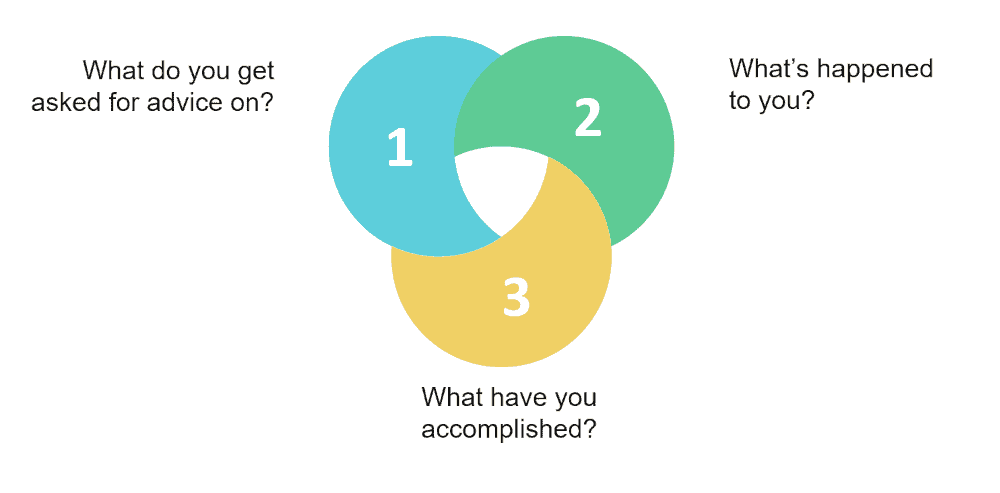
I started my training company in 2001, so that’s 21 years of running a digital training business. I felt I had something to offer others thinking about online course creation and digital training. And it’s all based on my life experience.
Think about all the things you’ve experienced in your life.
What has happened to you outside of your education and jobs?
What have you accomplished?
These can include things like losing weight, parenting strategies, organizing your house (or your life), and putting on make-up. The list goes on and on.
Do people ask you for advice on anything? If so, that may make a great course idea.
Here are a few course creators who started their businesses based on their life experiences:
- Learn How Arantxa Mateo of 32mondays.com Used Her Background in Biological Sciences to Become an Authority in Losing Weight
- How Caitlin Pyle of ProofreadAnywhere.com Grew Her Digital Training Company to $2 Million/Year
- How Melissa Esplin of Calligraphy.org Turned Her Love of Calligraphy into a Profitable Business
And between these four areas of your life, there may be multiple areas that overlap. Your education, certifications, jobs, and life experience are all part of you.
Spend some time brainstorming about your knowledge and experience to figure out some topic ideas that appeal to you.
Finding a Profitable Topic Idea
Now let’s cover how to find online course ideas that will likely be profitable whether or not you have any knowledge of them.
Even on this path, I still suggest you at least have an interest in the topic. That’s because there are thousands of profitable course ideas out there. So there’s no reason not to at least pick the one you have some interest in.
Here are a couple more tips before I go into the simple steps for finding these popular topics:
Tip #1: Find a Topic in Alignment with Your Beliefs or Habits
If you like eating junk food all the time, you smoke and drink, and your only form of exercise is finding your remote, it probably doesn’t make a lot of sense to start an online business in fitness and wellness. This is especially true if you don’t plan to change anytime soon.
You could hire out all the course creation, but still, you’re the face of that company. To start and grow a business like that, you’ll live and breathe exercise routines and healthy living, which contradicts your way of life.
So it just isn’t a great fit. It’s always easier to go with our beliefs than to go against them.

So even though I’m going to show you a couple of ways to find profitable niches, you should evaluate them against your beliefs. Make sure to find something aligned with your core habits and beliefs.
Don’t pick something contrary to who you are.
Although if you’re 100% set on changing, then it might help you become who you want to be.
Tip #2: Leverage an Interest
Commit to spending time to accomplish a goal for yourself as well as for others. As mentioned in the previous tip, if you’re 100% committed to starting something new, then the new thing is in alignment.
With my first business, I had not yet taken or even prepared for the exam I decided to start a business around and that was OK.
Since I was decent at organizing information, I knew I could take good notes as I went through the material and organize them. From that, I planned to put together a full-blown course for others, hoping I’d make a little money along the way.
The point here is you don’t have to be an expert. The desire to pursue an interest can go a long way.

Leveraging an interest is also really great for new topic areas.
For instance, bitcoin was brand new a few years ago. No one knew much about it back then, but if that was an interest of yours then you could have leveraged that interest.
So you don’t have to be an expert. Sometimes you may be passionate about the topic.
The ‘no-code’ movement is another example.
People who jumped on it at the beginning were likely not experts (since no one was). But they had an interest in figuring it out. Now they’re at the forefront of a new training opportunity.
Tip #3: Find a Subject Matter Expert or a Partner
You may already know you’re not going to create any of the content for your online course. And that’s fine. In that case, you will need to find a subject matter expert (SME) to help you create your course content.
You may have great ideas for how to run the company and provide leadership to your learners and the SME. That’s more than enough. In that case, you can hire out your content creation.
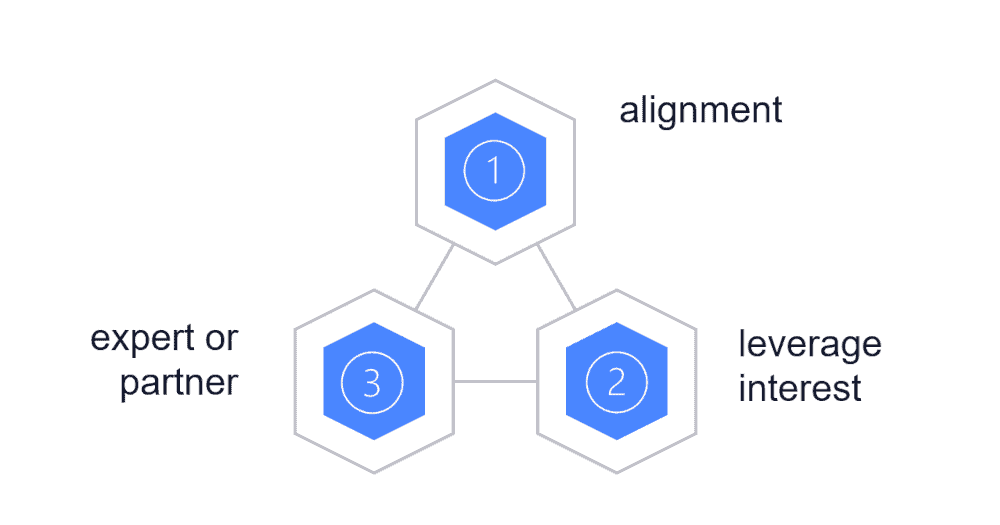
A partnership can work well too. For instance, if you’re great at marketing and you find an expert in a specific topic, then you might have the makings for a perfect partnership.
So in these cases, easy access to the SME or partner can help determine your topic.
Even then, I still wouldn’t suggest going into something that contradicts your core beliefs or habits. It would be great if you still had an interest or some alignment in the topic.
Now that I’ve set the stage, here’s how you can find those popular course ideas.
Find Popular Online Course Topics According to Online Searches
If you’ve ever used a keyword research tool like ahrefs.com or many others, then you’re already familiar with this.

You type in your topic idea into the search bar, and the software gives you alternate keywords. Many of these tools will also tell you how many people search for that keyword per month.
And the most advanced will also tell you, approximately, how hard it will be to rank for those keywords. These tools offer a great opportunity for conducting market research.
You can find trending course topics as well as topics that are tried and true.
I spent a lot of time putting together the most searched for online course topics in a previous research study. Here are some stats from that study if you’re interested:
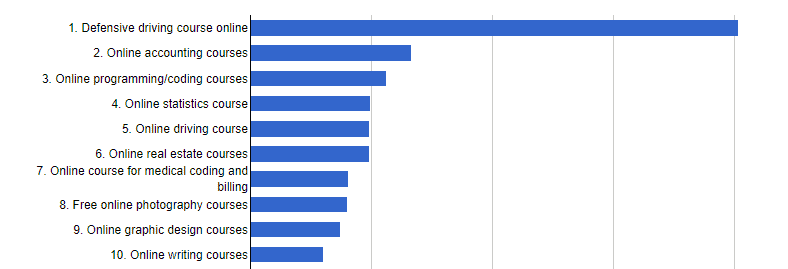
As you can see, people want to learn how to drive defensively! That was the number one search for an online course topic at the time of my study. Accounting courses, programming and coding courses as well as statistics, real estate, medical coding, photography, graphic design, and online writing courses all made the top 10.
I have quite a few more popular online course topics for you. They’re all broken down into categories for you to make it easier to search for them. All these were compiled with a keyword tool.
Alternatively, you can check out a keyword tool on your own and see how your ideas stack up. Ideally, you want a keyword with a decent number of searches per month. So if two people search for your keyword per month, then that’s not enough. You want some volume.
And if there’s a mix of keywords, that’s OK. With a mix, maybe not everyone’s typing in the keyword the same way when they search Google, but they’re typing in a lot of variations. In the end, there’s enough to get to a decent search volume. It’s nice to get at least a few hundred searches per month if not more and have several keyword variations.
Then, of course, if these aren’t competitive keywords, you hit the jackpot. Often course topics will be somewhat competitive, especially if it’s a popular topic. You’ll have to work to build up authority in your market, which is just part of running a business.
Choose a Popular Market
I’ve interviewed over 200 successful online course creators so far, and several markets keep coming up. That’s because they are so popular. You can check out the best niches just by searching around instead of using a keyword tool.
Think about what you, your family, or your friends are interested in. Many of these will likely be popular and profitable course topics. Check on sites like Udemy for what is trending and popular. Come up with as many ideas that appeal to you as possible.
You will need to differentiate your training to stand apart and not just look like another ‘me too’ company, but getting into one of these markets it’s probably a good move as far as putting you on the path to success.
The chart below includes data from about 40-course creators interviewed in 2019. It shows you the breakdown of the markets they were in:
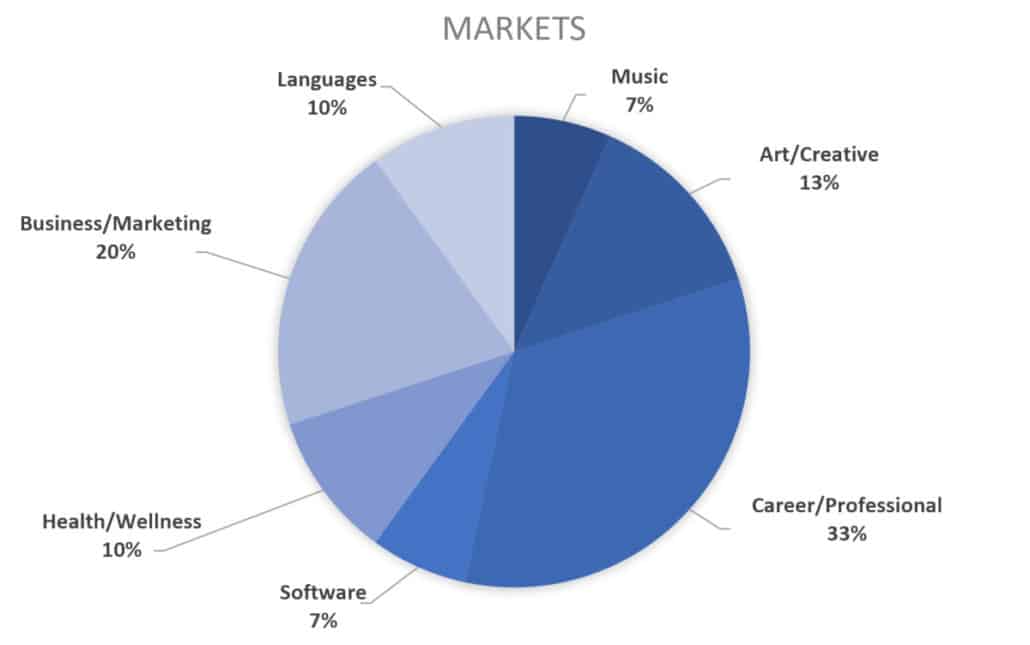
I’ll cover both of these options and how to brainstorm for each.
At this point, you should have a list of ideas. Now you need to validate them. People need to be willing to pay for your course in order for it to be worth your time (at least if you’re planning on making a profit). It would help if you also think about how you will attract traffic to your sales page before you select your idea.
We’ll take your list of course ideas and start validating them to see if any idea is more likely to work out more for you than others.
Ask Your Followers & Subscribers (If You Have Them)
One of the best ways to validate is to ask people if they have an interest in your course idea or get them to buy before you create your course. However, to do this, you need an existing email list or followers.
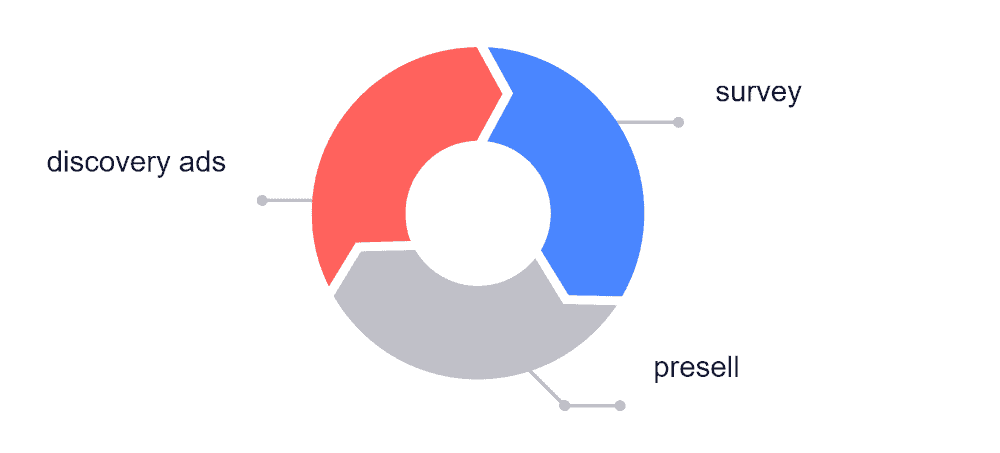
Now where this all breaks down is that most people who are starting don’t have a list of email addresses or followers on social media platforms!
And why would you? If you’re already a famous blogger or author or speaker in your market, then great. You probably didn’t need to read my guide at all.
But this whole idea of validation by asking people doesn’t work if you’re starting out and have no people to ask.
The other issue with this type of validation is that money talks. If you’re asking people, ‘hey, would you like a course on such and such?‘ A lot of them are going to say, ‘sure.’ But it doesn’t mean they’ll buy it after you create it.
The difference between them taking a second to tell you ‘ya sure‘ and them pulling out their wallet and making that commitment to learn a new skill or take the time to go through your course are two completely different things. So a survey that has no financial responsibility tied to it isn’t the best way to validate.
A better way is to offer a significant discount on a course you plan to create.
An example would be where you say ‘you can get my bitcoin course for $99 instead of $299 if you buy it now‘. Obviously, make sure you create it if people pay you money. If for any reason, you don’t end up creating the course, then you need to refund that money.
Another option is to run ads to a page with a ‘buy now’ button that doesn’t take people to a checkout page. Instead, it takes visitors to a page with text stating it’s not yet created. Offer people the opportunity to sign up, so they can receive a notification when it is created.
Now, I’m not entirely sure this is legal, but aside, it’s kind of a jarring experience for potential customers. Plus, you’ll be spending money without any chance to make any money (at least not for a while).
In full disclosure, I’ve never tried any of these options other than asking my list if they have an interest in my course. I’ve not sold something I had not yet created.
I think the best place to start whether you’ve got people you can start selling to or not is to actually look at the existing market. I’ll get into that next.
Research Your Competitors
If you can spend some time researching your competitors, it’ll pay off in more ways than one. For starters, the research will help you validate your course topic.
Validation is not just about whether or not people will buy your course, but also whether or not you can find them. Again, I think you should do some research even if you can validate your idea through an existing subscriber or follower list.
First, let’s research competitors to make sure you’re not going into a topic area where there are no buyers. You may think it’s better to get into a topic where you’re the first, but unless you already have a big list of people who can’t wait to buy your course, this can backfire.
It’s typically better to get into a topic area where you have competition. That way, there’s already a track record of people paying for information on your course topic.
An easy way to start looking for your competitors is to search online. Type in your course topic like a potential learner would and see what pops up. You want to add in ‘course’, ‘training’, or some word that will result in courses showing up.
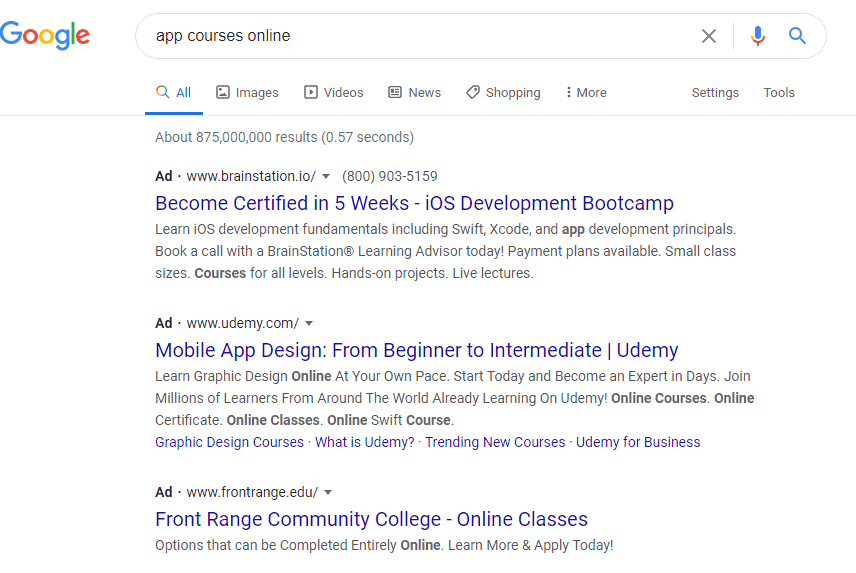
I typed in ‘app courses online,’ which would be for people who want to learn how to design apps.
In this case, there are a lot of courses already on the market, which is a good sign.
You can take this a little further and start researching what your potential competitors are charging and exactly what they offer in their courses. You might even want to create a spreadsheet and list them all.

Seeing what’s already out there will help you figure out the direction you should take for your course or whether or not you pursue it at all.
Now, if you don’t see any other courses, then this may not be a terrible sign. You might try other qualifying words like seminar, boot camp, academy, or anything else that makes sense. Then if you see any competitors, take a few notes on them, and keep looking for more.
Next up, you should search Udemy.
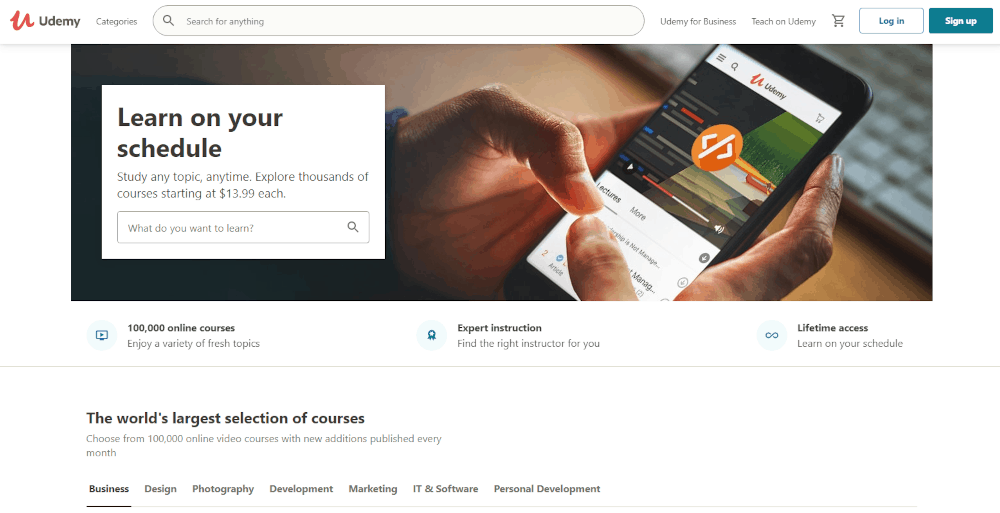
Udemy is an online course marketplace. So you want to look around here for your topic. Type topic related words into the search bar and then add any courses that come up to your list. Include the price along with what the buyers receive.
Then you can do some additional research on other sites like Udemy. These include Skillshare and even websites that specialize in a specific industry.

For example, there might be a big self-help site with lots of courses in your market. See if they’ve got anything similar to the topic you’re thinking of creating a course around.
If so add those to your list.
Another type of product that’s not a course, but is in the same vein are books.
So visit Amazon, type in your course topic idea, and see what comes up. Makes sure to add those with your notes and label that it’s a book, how much it costs, and any other information you want to collect.
Now you’ve got to ask yourself the following questions:
- Are there competitors?
- Based on your research, do you think people pay for information in this market?
That’s the crux of your question right now. Hopefully, you’ve reassured yourself that they do.
Who Is Your Target Audience?
It’s beneficial to understand who your target audience is. For instance, if you’re thinking about creating an NCLEX course, then you are targeting people in nursing school who still need to take the NCLEX. You’re not going after nurses already in the field.
Nurses only have to take the NCLEX once, and it’s right before they start looking for a job. So you need to catch a particular audience at a specific point in their lives. It would help if you thought about where they go online to connect with others and find information.
Doing a little research on what these people have in common is well worth it. They are likely in nursing school. Think about where these people may be online and what types of questions they are asking. You can probably find them that way.

Another example is weight loss. Maybe you want to put together a course on weight loss after pregnancy.
In that case, your target audience is women who are pregnant. Or to get more specific, women who just had a baby and now they’re thinking about weight loss.
Spend some time brainstorming who your audience is. The main reason to do this is so you can figure out where your audience is online. I’ll walk you through that in the next section.
At this point, you may not be super clear on this. Some topic ideas make it easier than others. But spending the time to figure out who your audience is may even help you narrow down or broaden your topic idea later on.
Research Quick Traffic Wins & Paid Ads
You want to figure out where your target audience frequents online. Trust me, creating a course and then not being able to find your target audience is painful.
So how can you reach them? For instance, if you hold speaking engagements out in the real world, then you already know you’ll find your audience at those speaking events.
But it can get complicated online. There are dozens of different ways to reach your target audience online.
You can use a keyword tool like Ahrefs or Google Trends to uncover and then target keywords through SEO or paid ads. However, SEO will take a long time (plus you have to be good at it), and paid advertisements on Google Adwords will be expensive. These methods work, but it will be smart to look into other, easier ways too.
So the first thing you should do is look for quick traffic wins. Quick traffic wins are where you piggyback off a site that your target audience already visits.

These include forums already established in your topic area. You can look at blogs and podcasts. You can also see if Facebook groups already exist in your topic area.
These are primarily online communities where your target audience probably hangs out. Once you find them, there’s a high chance you can siphon off some of their traffic by giving out helpful advice.
These are all quick ways to generate traffic.
So look around and see if there are any communities (forums, blogs, podcasts, etc.) in your target market. See what people are saying there, especially when it comes to your topic.
If there are places you could try to siphon traffic off, then that’s great. If not, then that’s going to make it hard for you to get sales for your new course.
Another piece of data I want you to collect is whether or not people are doing paid ads in your target space. Are competitors running paid ads on Google Adwords?
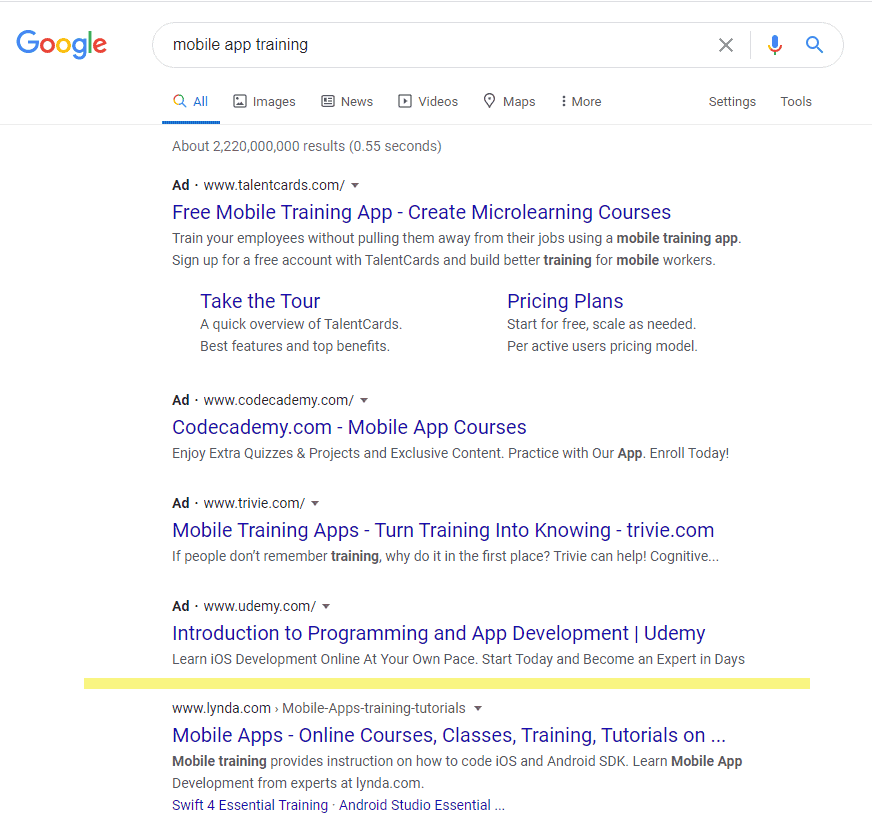
In the example above, you can see that they are. Paid ads are a good sign.
Whether you’re going to run them or not, it means people are making enough profit to afford paid advertisements. And paid ads are another way to get quick traffic (although, they’re not free).
Also, if you go to a site running Adsense ads (which is Google’s advertiser platform for niche sites), then you will often see those ads running. I see a lot of my competitor’s ads when I go to random websites. They follow me around. See if that happens to you. Then you’ll know if people are running Google display ads.
You can do the same on Facebook. Just look at the ads that show up in your newsfeed. If you’ve been searching around looking at NCLEX materials, then ads for your NCLEX competitors will show up.
Doing this little bit of research helps you see if there are ways to get quick traffic to your course if you decide to create it.
This research is like doing undercover validation work. If you don’t have an audience you can presell your course to; it’s the next best thing.
At this point, you should have a list of online course ideas that have gone through the validation process. You may have already thrown out several of your original ideas.
Now you need to select just one idea to center your online course creation around. You may need to consider broadening or narrowing your course topic, which will be covered in this section.
If you cannot find competitors, cannot find communities online that your target audience visits, and don’t see any paid ads, then you should consider scrapping that particular idea.
Only keep the ideas where you can at least find your target audience. That’s the most important piece of the puzzle.
By looking at your market, your competitors, and places online where your target audience might hang out, you’ll be able to see specific questions people are asking. These questions may lead you to further refine your idea.
For instance, maybe no one offers one on one coaching with their NCLEX course. Through your research, you’re seeing a lot of people ask for it. Now you’re thinking if you select NCLEX as your course topic, you’ll include coaching.
Or maybe you were going to go into weight loss after pregnancy, but see that weight loss for some other market is a better fit for you.
You might also go from a vague topic to one that is more refined. Like programming to no-coding. Or no-coding with a specific tool.
Your research might help reinforce that you’ve picked a good market or, again, that you need to change up your idea a little.
Now is the time for you to select your best option. You want to make sure you are addressing specific problems with a real need that people will pay money to resolve.
Make sure there is market demand for your course content.
If you’re thinking about entering a brand new market and cannot find your target audience online, then try going a little broader so you can find those communities.

For instance, if you were thinking of getting into bitcoin when it was brand new, you could probably find your audience from day trading communities. Ultimately, you could create a bitcoin course, but find your audience from the broader day trading topic.
If you’re in a new market, then check Google Trends to see if your topic idea is trending up. You don’t want to pick an idea that’s going nowhere, or worse, declining.

At this point, hopefully, you’ve selected your topic (or are starting over if nothing panned out). Figure out whether or not you need to refine or broaden your topic and start settling in on your online course idea!
I’ve walked you through my 3-step process to help you come up with a profitable idea for selling online courses. I’ve duplicated my success several times in more than one online business by following this exact process, so I know it can work for you too.
And next up, you can review my guide on how to create an online course if you’re ready to move forward!

Lisa Parmley is the founder of coursemethod.com. After gaining a Master’s degree in Biology, she worked in research for about 7 years.
Lisa decided to start her own training company in 2001, helping people pass a professional exam. In that time, she created online courses as well as books, DVD’s, CD’s, and testing software. That course has earned multiple 7-figures throughout the years.
She created SEO and authority site building training around 2007 which went on to earn well into the 6-figure mark.
She has 21+ years of experience in the trenches doing both creating and selling online courses. Download her 7-figure Online Course Success Blueprint here.